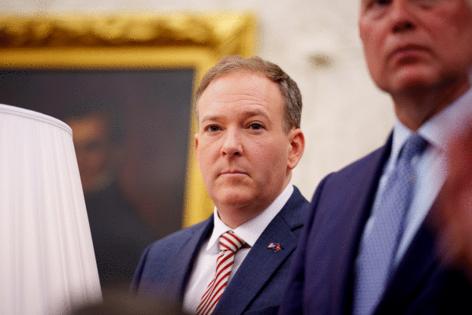Trump EPA moves to nix key Obama-era finding, last remaining tailpipe emission rules
Published in Business News
WASHINGTON — The Trump administration moved Tuesday to eliminate the last major environmental regulation on the U.S. auto industry.
The long-expected step came via a proposal to eliminate a key 2009 finding that enabled the U.S. Environmental Protection Agency to regulate greenhouse gas emissions. The repeal of that finding could trigger a seismic shift in U.S. environmental regulations and deliver an especially large impact on the highly polluting transportation sector.
“With this proposal, the Trump EPA is proposing to end sixteen years of uncertainty for automakers and American consumers,” EPA Administrator Lee Zeldin said in a press release. He added that the past Obama and Biden administrations "twisted the law" and "warped science to achieve their preferred ends," resulting in high costs for families.
President Donald Trump, some six months into his second term, had already presided over the disarming of federal fuel economy standards and cancellation of California's ability to set influential zero-emission vehicle sales requirements that states could opt into. Collectively, his actions now amount to a swift dismantling of regulations that have shaped a crucial national industry for 16 years and promised to guide it into a more climate-conscious future.
The repeal of the Obama-era finding, widely known as the Endangerment Finding, could be a precursor to removing all EPA greenhouse gas standards for new motor vehicles dating back to 2010. That includes the latest standards, finalized last year, that Trump and other Republicans have vigorously called an "electric vehicle mandate."
Nixing the Endangerment Finding also likely will tee up changes to how the federal government regulates other major sources of climate-altering emissions beyond autos, experts say, including power plants and airplanes. Environmental groups widely condemned the proposal.
"Transportation pollution is the largest source of climate pollution in the United States (and a major source of other toxic emissions). The EPA is now saying that the pollution from cars and trucks doesn’t endanger health, EPA is blatantly ignoring the 'protection' in their name. It’s not OK,” said Kathy Harris, director of the Natural Resources Defense Council's clean vehicles program, in an email.
"This is a blatant giveaway to the oil industry — and one that will cost drivers of new cars $6,000 on higher fuel costs and more maintenance and repairs. The only winners here are the fat cat oil executives Trump asked to donate to his campaign," she added.
Businesses and trade groups in the auto sector — including Dearborn, Michigan-based Ford Motor Co. — cautiously cheered the move, but suggested there should still be regulation of tailpipe emissions.
“We appreciate the work of President Trump and Administrator Zeldin to address the imbalance between current emissions standards and customer choice. Current standards do not align with the market, and America needs a single, stable standard to foster business planning," Ford spokesperson Robyn Jackson said in a statement.
She added: "The standard should align with science and customer choice, reduce carbon emissions by getting more stringent over time, and grow American manufacturing. We'll be working with regulators on a policy that serves all these goals."
The Alliance for Automotive Innovation, which represents all major U.S. automakers except for Tesla Inc., issued a similar statement: "We’re reviewing today’s announcement covering the endangerment finding to understand what it means for U.S. vehicle emissions rules going forward," said John Bozzella, the group's president and CEO.
"At the same time, there’s no question the vehicle emissions regulations finalized under the previous administration aren’t achievable and should be revised to reflect current market conditions, to keep the auto industry in America competitive, and to keep the industry on a path of vehicle choice and lower emissions.”
General Motors Co. and Stellantis NV both deferred to the alliance's comment on the topic. The Detroit Three — which includes Ford, GM and Stellantis — tend to have the worst fuel economy performance among all major automakers operating in the United States.
The American Petroleum Institute, the largest U.S. trade association for the oil and natural gas industry, also praised the Trump administration after the EPA revealed its proposal on Tuesday.
"We support Administrator Zeldin's proposal to repeal the Biden administration's costly and unrealistic tailpipe rules, which would have effectively banned new gas-powered vehicles," API President and CEO Mike Sommers said in a statement.
He continued: "This is a critical step toward restoring consumer choice and protecting the freedom of all Americans to decide what they drive. We look forward to working with the administration on policies that help reduce emissions while ensuring reliable and affordable transportation options for consumers."
The Trump EPA has said that vehicle rules enabled by the Endangerment Finding have cost over $1 trillion, though the NRDC pointed out that the number does not account for benefits from emissions regulations. An analysis from the Biden EPA last year, by contrast, estimated that the latest vehicle rules would yield $2.1 trillion in net benefits over 30 years — including $820 billion in fuel savings and $1.8 trillion in public health and climate benefits.
The proposal to repeal the Endangerment Finding does not take effect immediately, and opponents have vowed to challenge it in court.
“It’s outrageous to justify this recklessness with the ridiculous claim that cutting planet-warming pollution is more expensive than the billions it will cost consumers at the pump and the hospital because of climate devastation," said Dan Becker, a longtime environmental advocate and director of the Center for Biological Diversity's Safe Climate Transport Campaign. "We’ll fight them every step of the way.”
The public will also be able to comment on the proposal through Sept. 21 and via virtual public hearings. Information for doing so is available on the EPA website.
©2025 www.detroitnews.com. Visit at detroitnews.com. Distributed by Tribune Content Agency, LLC.












Comments